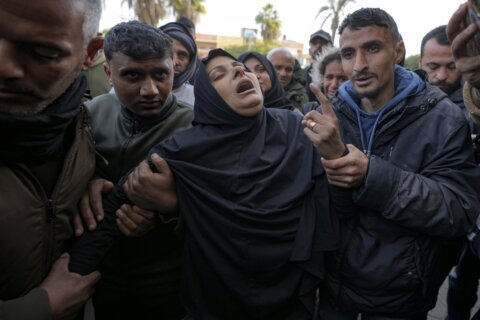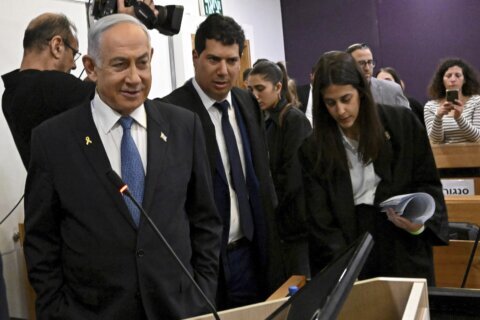BAKU, Azerbaijan (AP) — Nisreen Elsaim has been a climate activist for a dozen years, much of it focusing on the intersection of war and climate change. In April 2023, it became personal, when she awoke in her native Sudan to the explosions and gunfire of an erupting civil war.
Elsaim, her husband and their infant son eventually fled the country, among the millions displaced by a war that decimated crops and livelihoods. Those who went to refugee camps found themselves displaced again when heavy rains and flooding destroyed shelters and severely hindered aid delivery in a country the United Nations ranks as one of the world’s most vulnerable to climate change.
It’s a story Elsaim is telling at the United Nations climate talks in Baku, which she says must succeed for countries like hers to have any chance to successfully adapt to climate change.
“We don’t have the privilege of losing hope,” she said.
The chief goal of COP29, as this year’s talks are known, is working out how much money wealthier nations will pay to help developing countries like Sudan. It’s a task that all sides — world leaders, protesters and experts — say is made more difficult by wars like those enveloping Gaza and Ukraine.
The wars are a distraction from confronting the climate crisis, they say. They waste money that could be used in the climate fight. And they cast doubt on the world’s ability to cooperate.
“We meet at a moment where faith in our ability to stand together is broken,” Al Hussein bin Abdullah, the crown prince of Jordan, said in a speech in Baku’s opening days. “Saving our planet must start from the premise that all lives are worth saving. The solidarity we need depends on embracing that truth.”
Many world leaders used their opening remarks to describe how extreme weather had ravaged their countries, making issues such as poverty, energy security and access to water and food worse or more uncertain. And that risks more conflict, they said.
“Climate change is now emerging as a major global threat and influencing the escalating of geopolitical tensions. It primarily exacerbates the problems of poverty eradication, food and energy security as well as access to water and resources,” Uzbekistan President Shavkat Mirziyoyev said.
In the Middle East, Israel’s war in Gaza has caused widespread destruction, including collapsing water and sanitation systems. It’s also undone Gaza’s progress in a range of environmental areas, including solar power, water desalination facilities and wetlands restoration, according to the United Nations Environment Programme. The destruction of solar panels threatens soil and water with leaks of lead and other heavy metals, the UN said.
And Russia’s war in Ukraine has sent the equivalent of 150 million tons of heat-trapping carbon dioxide into the atmosphere that wouldn’t have happened without the war, according to a 2023 report from the Initiative on Greenhouse Gas Accounting of War, a group of researchers whose funding comes in part from the European Climate Foundation. That’s more than the annual greenhouse gas emissions from a country like Belgium.
Achim Steiner, chief administrator for the United Nations Development Programme, said billions of dollars that could be used for poverty eradication, climate finance, education and other good causes are instead going toward war.
“We are a more divided world and a divided world struggles to sit around the table and overcome differences in order to focus on shared interests,” Steiner said.
Dozens of protesters in Baku specifically targeted Western support for Israel. One of them, Lise Masson of Friends of the Earth International, said countries like the United States and Britain, as well as the European Union, could spend more on climate finance instead.
“It’s the same systems of oppression and discrimination that are putting people on the front lines of climate change and putting people on the front lines of conflict in Palestine,” she said.
Catherine Abreu, director of the International Climate Politics Hub, a network of organizations and people working on climate action, agreed that wars add to “cascading crises” and can stretch a government’s ability to respond to other problems. And she said it would be “incredibly powerful” if those wars ended and military spending was immediately shifted to climate action.
“When, you know, the ability of developing countries in particular to adapt to and respond to these crises was being better supported by the wealthy global north then we might see an acceleration of climate action,” she said.
But she said she sees broader challenges — the COVID hangover, heavy debt loads and economic slowdowns — as primarily responsible for slow progress in climate talks.
Greg Puley, head of the climate team at the United Nations’ Office for the Coordination of Humanitarian Affairs, acknowledged concern that global conflict could prevent leaders at COP29 from reaching “the most ambitious possible deal.” But he and others are determined to avoid that.
“We cannot afford for business as usual to continue. We cannot afford for the difficult geopolitical environment to prevent major reductions in emissions, major new investments in adaptation and resilience,” Puley said. “We’re not going to be able to respond to the climate-related disasters of the future unless we take bold steps now.”
___
This story corrects Greg Puley’s title to head of the climate team at the United Nations’ Office for the Coordination of Humanitarian Affairs.
___
Pineda reported from Los Angeles.
___
The Associated Press’ climate and environmental coverage receives financial support from multiple private foundations. AP is solely responsible for all content. Find AP’s standards for working with philanthropies, a list of supporters and funded coverage areas at AP.org.
Copyright © 2024 The Associated Press. All rights reserved. This material may not be published, broadcast, written or redistributed.






